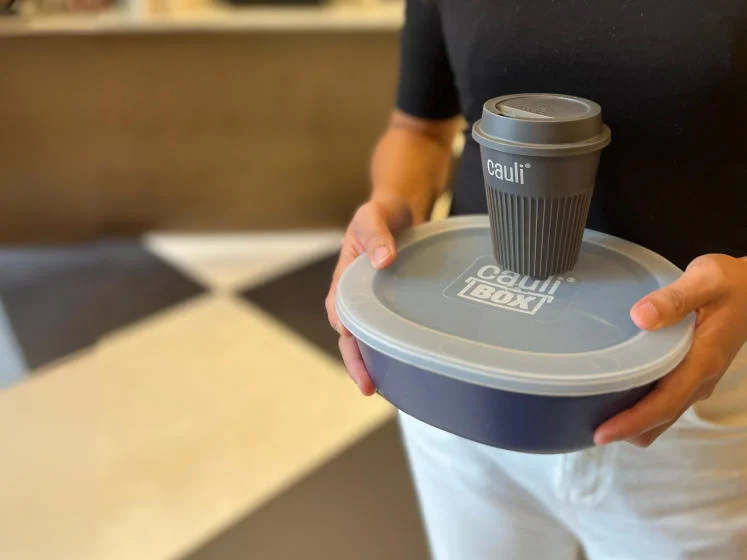Tackling the single-use epidemic

For Earth Day 2024, we spoke to an alumna engaged in the #PlanetvsPlastics fight. Mingqiao Zhao (MSc Comparative Politics 2016) is co-founder of climate tech start-up CauliBox, which seeks to disrupt the food industry’s dependence single-use packaging.
The Idea
When my co-founder Jo and I were studying in London, we loved to grab food and drinks to go. Yet we hated the single-use packaging. Research over the past decades has shown that reusable packaging has the potential to save up to 92% of CO2 compared to single-use packaging. We wanted to create a circular economy system like shared bikes, but for food boxes and coffee cups. Customers can take out a reusable container and return it after using. It is washed and then used again and again, sending zero waste to landfill.
This led to CauliBox, which we founded to disrupt the $800B single-use packaging market. Today we are the largest reuse system provider in the UK for foodservice. We are also AI pioneers as we use this technology for our reverse vending machines, the CauliKiosks, to collect containers. Each container is uniquely identifiable, giving us valuable insight and transparency using AI into the full life cycle of Cauli packaging, consumer habit and impact.
Getting Started
We thought if a company can be called Apple, why can’t we be called Cauli? The containers are not actually made from cauliflowers. They are made from100% recyclable polystyrene that can be reused at least 400 times. We did initially explore natural fibres such as bamboo or wheat husk, but they required microplastics to hold together and were mostly unrecyclable at the end of their lifecycle. We also explored packaging options that claimed to be eco-friendly, compostable or biodegradable. However, we found that many producers did not tell their customers whether the materials took 10 days or 100 years to biodegrade, or if they were only compostable in specific commercial conditions. It just wasn’t good enough.

We believe there are good plastics and bad plastics. Reuse brings out the best out of good plastics - those that are durable and recyclable - to deliver measurable CO2 savings. Changing consumer behaviour is of equal importance; so much of what we do is about making reuse easy and accessible to all.
LSE Generate
We were part of the inaugural cohort of LSE Generate.Kajal Sanghrajkaran the accelerator program and was simply amazing. She advised us on a wide range of topics from team building to fundraising, to setting up an advisory board. Upon graduating, we secured our first institutional funding by SFC Capital, who had heard about us through LSE.
The entire team at LSE Generate continues to be our great advocates. They involve us in communications and events, and give us a platform to connect with customers, investors and other alumni entrepreneurs. It’s by far the most value-adding programme that we have taken part in. Personally, it’s also special to continue being part of the LSE ecosystem after my graduation in 2016.
Impact
To date we have directly prevented over 300,000 pieces of single-use packaging from going to landfill. Indirectly, we have also helped reduce cross contamination of waste streams, saved food from being wasted, and transformed organisational culture and individual behaviour. Of the 40 sites currently using CauliBox, over half are now disposables free. We are training our AI to detect more types of packaging, lids and cutlery as well as identifying wear and tear for end-of-life recycling. Customers now have the option of using our mobile app or simply their card to link and borrow a container, removing barriers of entry. Our in-app digital rewards programme, called CauliCoins, is extremely popular. It gamifies, rewards and reinforces reuse behaviour.

The future for CauliBox
We are on track to prevent one million pieces of disposable packaging by the end of 2024 and 15 million pieces by the end of 2026. Our next milestones involve disrupting retail and delivery, as well as the European and American markets. We are not actively raising funding until 2025 to focus on growth, but we welcome external capital to help us get to our milestones faster.
My hopes for CauliBox are as much about the environmental impact as about taking care of the team. Jo and I get up every morning feeling motivated by our team’s passion and grit. We are trying our best to build a truly inclusive and empowering culture, where our planet will benefit when we look after our people.
Advice for alumni entrepreneurs
Many sustainability startups cannot find a route to profitability, so fail and end up creating way more waste than they set out to save. Achieving our dual mission of "for good and for profit" is extra challenging, compared to non-impact driven tech companies.
My advice to alumni entrepreneurs is:
- Persevere
- Find strength in knowing your ultimate reward lies in making a difference to the world
- Learn to say no to "free trials" demanded by large clients, to greenwashing attempts by big corporations, and to investors who you instinctively know are a misfit.
Finally, have fun. When I was young, my dream was to become a football manager. Being a founder is like playing FIFA. You find the talent, lead the team, defend your market position, and score sales. Competition in a free market pushes us to be innovative and agile. In a way, I have already fulfilled my childhood dream, and my work life is more fun than any football match.
Mingqiao Zhao
MSc Government 2016
Find out more about CauliBox
April 2024